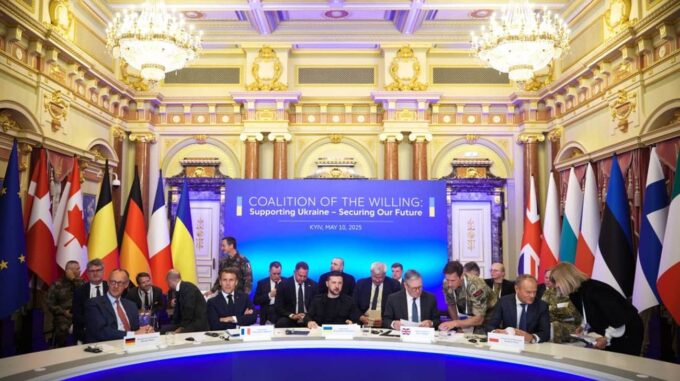President Zelensky accused Putin of creating an illusion of calm before Victory Day, emphasizing that Russia deliberately and temporarily reduced the intensity of shelling on the eve of May 9 to give the international community the impression of de-escalation and a possible “peaceful” plan

In reality, hostilities continue at the front, and the enemy persists in using aviation and artillery weapons against Ukrainian positions, said President Volodymyr Zelensky during a recent press conference with European leaders on May 10. The head of state pointed out that shelling and assaults on Ukrainian positions did not cease and were only briefly adjusted to create a "calm" effect before the major holiday—May 9. Zelensky reminded that the active phase of hostilities is ongoing: Russian forces are deploying aerial bombs, conducting artillery shelling—including in border communities—which indicates a lack of desire on the part of the enemy to achieve peace or reach agreements. "Putin has created an illusion of calm, but attacks on the front lines continue. This is a huge deception designed to make the world forget about the reality of the war," Zelensky commented. Regarding the so-called "ceasefire" announced by the Russian dictator in connection with the 80th anniversary of the victory in World War II, the Ukrainian president sharply criticized this initiative. According to Zelensky, this step is theatrical and is an attempt by Russia to temporarily reduce international focus on its aggression. In his view, Putin's true goal is to craft an image of a "peaceful" and sanitized leader for internal consumption, while in reality, the war continues. The President emphasized that Ukraine insists on a long-term and comprehensive security architecture that guarantees stability and safeguards Ukrainians from new aggressive actions by Russia. The main elements of this strategy include a 30-day unconditional ceasefire, increased sanctions pressure on Moscow, modernization of air defense systems, increased international military support, and investments in domestic weapons production. It also involves the creation of international contingents to ensure security and, in the long term, the development of mechanisms for cooperation with the U.S. to establish a stable framework for security guarantees. Zelensky stressed that Ukraine is ready for constructive dialogue and supports the American initiative to introduce a three-month ceasefire. However, Russia disregards these steps and continues active military operations. Besides political efforts, Ukraine is intensively strengthening its military capacity and enhancing defense capabilities through technological development, manufacturing, and protecting critical infrastructure. Depending on the background of the conflict, it should be noted that on April 28, the Kremlin announced a "ceasefire" in connection with the 80th anniversary of the victory in World War II, but this initiative was met with sharp criticism from Ukraine. Zelensky labeled it as "a staged act to create the image of Russia supposedly coming out of isolation," and proposed instead to agree on a longer—30-day—ceasefire, which was supported by the U.S. Regarding the situation on the front, Ukrainian defense structures reported that as of the morning of May 8, no enemy attack drones were detected. However, the foe has intensified tactical airstrikes to pressure Ukrainian positions. Due to missile strikes in Sumy region at 2 a.m., one person was killed and two others wounded. According to the Ukrainian General Staff, as of 16:00 that day, Russian forces continued assault operations along the entire front line. Official data indicate that the number of combat incidents has now exceeded one hundred—117 cases—once again underscoring the tense situation and the ongoing nature of targeted enemy attacks. Thus, the security situation in Ukraine remains extremely complex and tense. Although Russia tries to project an image of a temporary lull before the major holiday, Ukrainian leadership openly states during international negotiations their readiness for any scenario and insists on consolidating long-term security for the country and protecting it from new threats by Russia.

